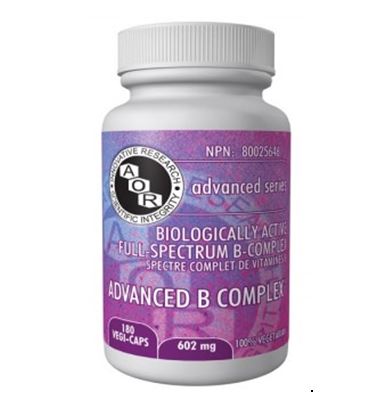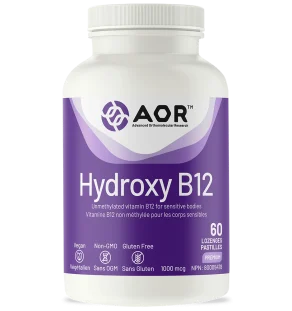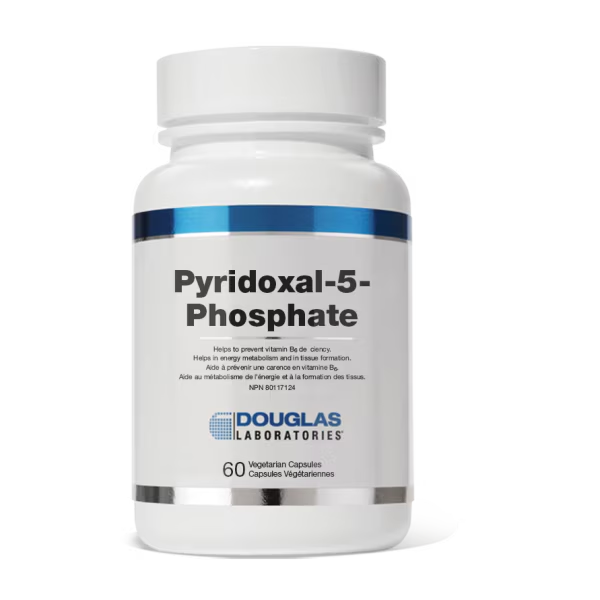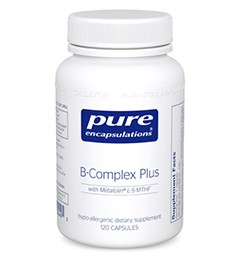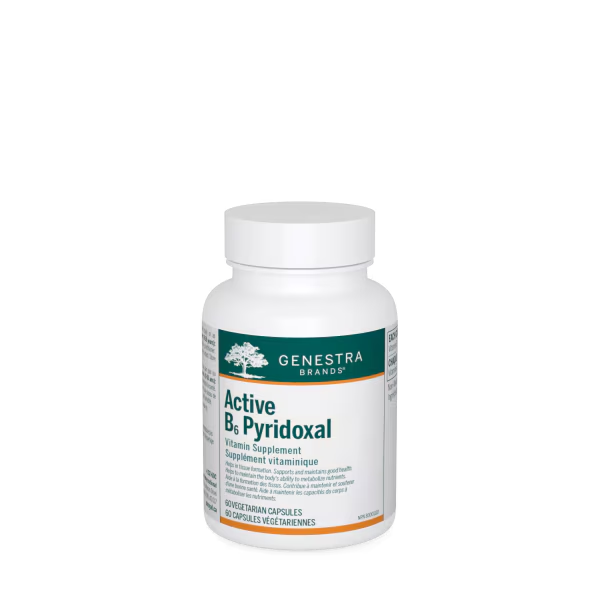The Best Mix of B Vitamins
- Contains the most effective forms of B vitamins
- Provides balanced, research-supported doses
- Maintains cellular energy production
- Supports the function of the brain and nervous system
ADVANCED B COMPLEX was designed to provide the most advanced forms of B vitamins in the most scientifically discerning ratios available. These nutrients help metabolize carbohydrates, proteins and fats for energy and support tissue and red blood cell formation.
180 Vegi-Caps
Serving Size: 3 Capsules
- B1 (Benfotiamine) 100 mg
- B2 (Riboflavin) 7.5 mg
- B3 312 mg (Niacin – from 388 mg Inositol Hexanicotinate)
- B5 (Calcium pantothenate) 300 mg
- B6 (Pyridoxal-5-phosphate) 100 mg
- B12 (Methylcobalamin) 1000 mcg
- Folic Acid (5-MTHF) 1000 mcg
- Biotin 500 mcg
- Choline bitartrate 600 mg
- Inositol 384 mg (from Inositol Hexanicotinate, Inositol)
Key Features:
- The most bioavailable forms
- Balanced dosages
Suggested Use: Take 1 capsule three times daily with food, or as directed by a qualified health care practitioner.
Cautions: Consult a health care practitioner for use beyond 8 weeks. People with thiamine hypersensitivity should not take this product.
Pregnancy/Nursing: Consult a health care practitioner
Source: Multi-Sourced
Main Indications:
- Anti-Aging
- Type 1 and Type 2 Diabetes
- Vitamin B Deficiency
Complementary Products: R+SR, Ortho-Glucose II, Carnosine-500
Busy B’s
The B complex is a group of essential vitamins with important roles in the body. Benfotiamine (a bioavailable form of vitamin B1) helps prevent cellular damage caused by high blood sugar. Riboflavin (B2) has an important role in energy metabolism. Niacin (B3) is the base of NAD and NADH, important coenzymes that are required in cellular respiration and energy production pathways. Coenzyme A is also a critical factor in these pathways, and its production depends on pantothenic acid (B5). P5P (B6) is required in many biological pathways, including amino acid metabolism and neurotransmitter formation. Methylcobalamin (B12) contributes to healthy nerve function. Benfotiamine and P5P help prevent the formation of advanced glycation end products which lead to age-related degeneration. Folic acid, B6 and B12 help reduce harmful homocysteine levels. Folic acid is needed for red blood cell and DNA formation and is essential during pregnancy.
The Costs of Deficiency
The importance of these vitamins is illustrated by the detrimental health effects that occur when they are deficient. B1 deficiency has been linked to type 2 diabetes. B12 deficiency leads to neurological disorders and anemia. P5P deficiency is associated with depression and neuropathy. Folic acid deficiency is associated with anemia and neural tube defects in infants.
Vitamins in Forms your Body can Use
B vitamins are essential, and it is important to get the right amount in the right forms. Advanced B Complex delivers the biologically active and most efficient forms of these vitamins.
The B-complex is an officially recognized grouping of eight essential vitamins.
Vitamin B1 (a.k.a. thiamin): Thiamin is required to convert glucose and amino acids into energy as well as to develop red blood cells and maintain muscle tissue. Thiamin deficiency has been linked to Type II Diabetes, particularly in the formation of advanced glycation endproducts (AGEs), which occur at an abnormally high rate among diabetics. Benfotiamine is a form of thiamin that has been shown in studies to be 5 times more bioavailable than regular thiamin. In fact, clinical trials have demonstrated that benfotiamine can improve nerve function by 30% and decrease nerve pain by 50% among diabetics.
Vitamin B2 (a.k.a. Riboflavin): While playing a role in the energy metabolism of carbohydrates, fats, and proteins, B2 is particularly active in skin and vision health. B2 has long been used as an adjunct in the treatment of neonatal jaundice and has recently been added to anti-migraine protocols as well.
Vitamin B3 (a.k.a. Niacin): The derivatives of B3 form the basis of the oxidized and reduced forms of Nicotinamide Adenine Dinucleotide (NAD+ and NADH), which are essential in the process of cellular respiration and energy formation. B3 also plays an essential role in DNA repair, removing toxic chemicals from the body, and assisting in hormone production. Niacin is also effective at inhibiting the release of low-density lipoproteins (or LDL [bad] cholesterol) into the blood from the liver, making it a treatment of choice for hyperlipidemia.
Most niacin supplements are in nicotinic acid form, which has been associated with a ‘flushing’ effect, an unpleasant warming and itching of the skin when taken at significant doses. Inositol hexanicotinate is a form of niacin that is free of this effect.
Vitamin B5 (a.k.a. Pantothenic acid): B5 is needed to form coenzyme A (later becoming acetyl-CoA), which is central to cellular respiration and energy production. Vitamin B5 has also been shown to have a positive effect on cholesterol levels, including lowered total and LDL (bad) cholesterol levels.
Vitamin B6 (a.k.a. Pyridoxine): Pyridoxal-5’-phosphate is the active coenzyme form of B6, and is a catalyst for at least 113 known essential enzymatic reactions in the body. These include the metabolism of all endogenous amino acids. P5P is also important for the proper metabolism of essential fatty acids as well as the formation of red blood cells and neurotransmitters, making P5P a factor in optimal cognitive function as well. A deficiency in vitamin B6 can lead to anemia, depression, dermatitis, hypertension, elevated levels of homocysteine and water retention, insomnia, premenstrual tension, irritability, muscle twitching, convulsions, and kidney stones. B6 has been successfully studied for its ability to enhance the immune system and alleviate the symptoms of autism, carpal tunnel syndrome (CTS), anemia, premenstrual syndrome (PMS), hyperhomocysteinemia and other conditions.
Vitamin B12 (a.k.a. Cyanocobalamin): Vitamin B12 has distinguished itself among the B-vitamins by its specific effects on neurological health. B12 is also very important to the methylation cycle. Methylcobalamin is the active coenzyme form of B12.
Folic acid is needed for the synthesis of new red blood cells and DNA. A deficiency can lead to megaloblastic anemia as well as elevated levels of homocysteine.
Biotin is another B vitamin that is involved in the metabolism of protein, carbohydrates and fats. Although not strictly a vitamin, choline is an essential nutrient that plays an important role in the structural integrity of cells and in the synthesis of the key neurotransmitter acetylcholine. Finally, inositol was once considered a B-vitamin and supports mood balance and healthy cellular growth.
*Prices and product availability are subject to change without notice. All specials and promotions limited to stock on hand.
*These statements have not been evaluated by the Food and Drug Administration. These products are not intended to diagnose, treat, cure, or prevent any disease.


